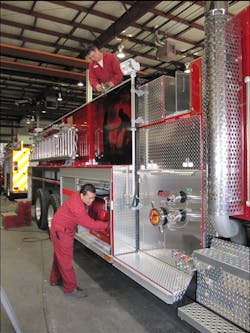The engine and transmission could arguable be considered the heart of any apparatus. And "cardiac care" is critical for virtually anything that is required to operate full-bore in tough conditions.
Water and dust and dirt are not friends of most all moving parts, particularly engines and transmissions.
In areas prone to flooding, like Louisiana, where Ferrara Fire Apparatus is located, it's important to keep water from being sucked into air intakes. That's why the company make sure the engine turbo intakes and any air filter is above the wheel line. That gives apparatus limited fording capabilities.
It's important to remember that virtually no vehicle can operate underwater or in deep submersion unless it's specifically made for that purpose.
While the air intakes are above a reasonable water line, they are still subject to getting dirty and clogged with particulates, which means they will need to be changed with more frequency in extremely dusty conditions.
"It's important to be aware of what you're doing with your apparatus," Paul Christiansen, Marketing Director, Aerial Product Manager for Ferrara said, noting that routine filter changing will make a big difference in the apparatus performance and life span.
Apparatus fluid levels need to be maintained and changed with frequencies appropriate to the conditions under which they are being used.
Rick Suche, the president and owner of Fort Garry Fire Trucks Ltd., in Winnipeg, Manitoba, Canada, is a big advocate of changing apparatus fluids on a regular basis as well with departments getting on a regiment of preventive maintenance that has regular service intervals.
And, he's also a big advocate of synthetic lubricants. He said they extend the maintenance intervals and can increase the life span of apparatus. Additionally, Suche said, synthetic lubricants work better in extreme temperatures.
"We have apparatus that work in temperatures from 100 degrees (Fahrenheit) to 40 below," he said.
Just as important as the engine and its fluids is the transmission. Too often, fire departments forget that critical part of the drive line and fail to service it properly, Suche said.
"Transmissions need to be serviced every 5,000 miles," he said, noting that departments that don't service the transmission regularly will pay the price when the component is blown because of neglect. Often, firefighters don't even realize they need to be serviced.
Christiansen agreed and said often the things that are not seen can cause the most harm if not serviced. "Things that are hidden don't get checked as often as they should," Christiansen said. And that can have unintended and expensive consequences.
Experts agree that having well-organized and regimented preventive maintenance schedules help keep apparatus functioning longer - especially in extreme conditions.
Engine coolant systems need special maintenance for proper operations in extreme temperatures.
Suche, who has apparatus in service in the Arctic, recommends special coolants that can stand up to the punishing low temperatures. The correct mixture also needs to be maintained so the coolant won't freeze or boil on the upper and lower ranges of temperatures.
It's easy for fire departments to check the coolant concentration with a readily available antifreeze hydrometer, said John Marvin, Service Manager for the General Safety Division of Rosenbauer America.
Steve Reedy, vice president and general manager of General Safety said all apparatus should have rust-inhibiting additives in the coolant to make sure coolant flows freely in the radiator to insure maximum cooling power.
Christiansen commented it's important to make sure the radiator is of sufficient size to handle the size engine in the apparatus and climate in which it will primarily be assigned.
Batteries can take a beating in the extremes too and maintenance is critical to effective responses. Suche said Fort Garry's standard apparatus have four group 31 batteries to power the vehicles.
"You want good cold-cranking power," Suche said. "In the fire service, we put huge draws on batteries."
To reduce that draw, Suche recommends any kind of equipment that will reduce the apparatus amperage requirements. LED lights, DOT running lights and warning lights as well help reduce battery draw significantly, he said.
There are some other fluids that firefighter must also pay attention to that can affect apparatus performance.
High on that list is diesel fuel. Suche said it's important to use the fuel best suited for which the apparatus is expected to work. In extreme cold, Suche said, apparatus need Number 1 diesel to prevent gelling. Number 3 diesel fuel would not work well in cold and could cause severe problems and cause the engine not to start or even stall because of the gel clogging the fuel lines.
Something to keep in mind is apparatus built and fueled in southern climates will not likely have cold-weather diesel in the tanks and when they arrive in cold climates, the will quickly develop performance problems, Suche said.
The same holds true for apparatus that is not used frequently, he added. Some may have summer or warm-weather blends in the tanks that hold over to winter. Additives can help prevent gelling, but it's better to have the proper fuel in the tanks at all times, Suche said.
In Minnesota, where General Safety builds apparatus, state law mandates that all diesel contain at least 5 percent biodiesel, according to Marvin, General Safety's service manager. In cold weather, the biodiesel can cause waxing, he said.
"When we have an unexpected cold snap, people go scrambling for fuel filters because of the waxing," Marvin said, adding that it would be a good idea to have a supply of diesel fuel filters on hand for just such emergencies.
Diesel additives, like deposit control additives (DCAs) and anti waxing agents, are good investments, Marvin said.
Many of today's diesel engines require urea to meet U.S. Environmental Protection Agency (EPA) clean-air requirements and that's a fluid that can freeze.
Suche said those tanks often need to be heated to keep the agent at a useable temperature.
As emission standards tighten, particularly in 2013, there may be additional pitfalls apparatus users and maintenance people will have to monitor.
More Articles and Podcasts From This Series
- Apparatus Maintenance: Severe Conditions Require Extra Apparatus Care
- Severe Service Maintenance: Heating, Cooling and Climate Control
- Severe Service Maintenance: Pump and Body Considerations
- Severe Service Maintenance: Undercarriage Care
- Firehouse Roundtable: Apparatus Maintenance
- Podcast: Rick Suche on Apparatus Maintenance for Severe Service
- Apparatus Makers Recommend Routine Maintenance for Safety
- Following Manufacturers’ Guides Keeps Apparatus in Top Condition
- Finding Qualified Technicians is Key to Apparatus Maintenance
- Firehouse Roundtable Apparatus Maintenance
- Podcast: Apparatus Maintenance: Bill Foster on Apparatus Safety
- Podcast: Apparatus Maintenance: Glenn Davis on Preventative Maintenance Programs
About the Author

Ed Ballam
Ed Ballam served as associate editor for Firehouse. He is the assistant chief of the Haverhill Corner, N.H. Fire Department, and a National Registered EMT. He is also a Deputy Forest Fire Warden for the New Hampshire Division of Forests and Lands. Professionally, he's been a journalist for over 35 years working for a variety of publications, including employment as managing editor of a national fire service trade journal for more than a decade.
